Key takeaways:
- Employers are encouraged to establish clear CBD policies to ensure a safe and transparent workplace, fostering open communication about employee health choices.
- The legal landscape of CBD use varies by state, creating complexities for employers and necessitating comprehensive drug policies that align with local laws.
- Future trends indicate a push for standardization in CBD regulations, enhanced employee wellness programs, and improved drug testing protocols to support workplace safety and employee rights.
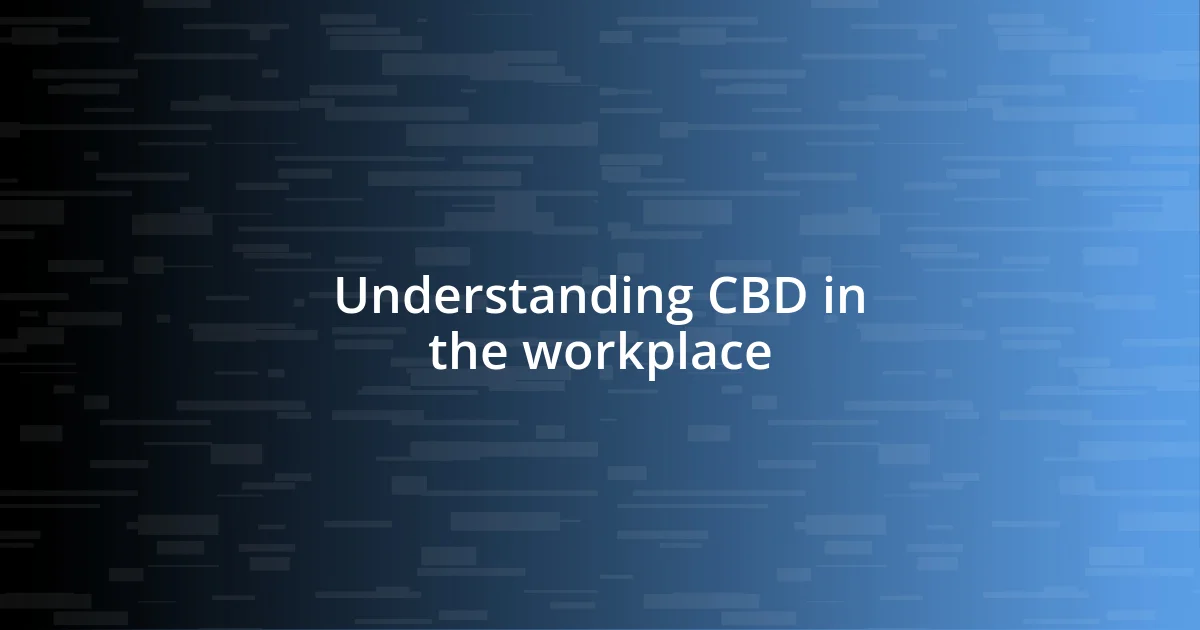
Understanding CBD in the workplace
Understanding CBD in the workplace involves recognizing how it influences both employee health and company policies. I remember when a close friend of mine, grappling with chronic pain, found relief through CBD oil. It was a game-changer for him, yet it made me ponder how workplaces would respond if he faced scrutiny for using it. Would management appreciate the benefits of such alternative therapies, or would they lean towards outdated stigmas?
As CBD continues to weave its way into mainstream conversations, it’s crucial for employers to establish clear policies. I’ve seen organizations struggle with this—employees unsure of whether they could face repercussions for using CBD products, even ones that are legal. It raises the question: how can companies create an environment where employees feel secure discussing their wellness choices without fear of backlash?
Navigating the legal landscape of CBD can feel overwhelming. Think about it: if CBD appears in a routine drug test, how does that affect job security, despite the product being legal and non-psychoactive? This uncertainty can lead to anxiety among employees who just want to manage their health effectively, emphasizing the need for transparent communication from leadership. It’s all about finding a balance where well-being and workplace integrity coexist.
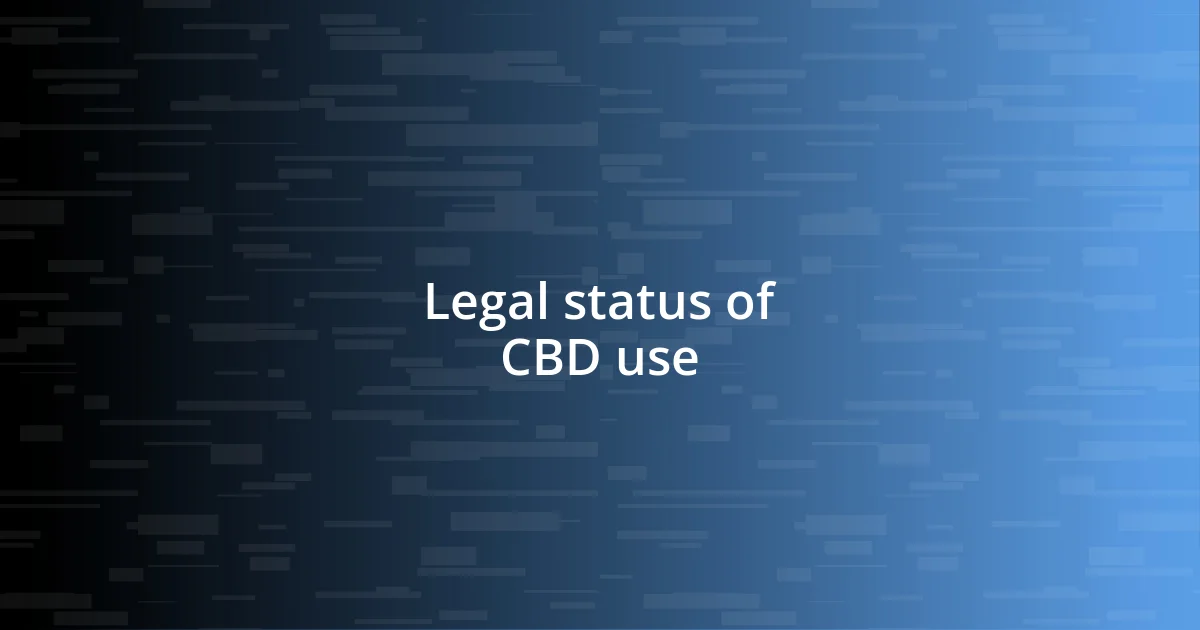
Legal status of CBD use
Legal status surrounding CBD use can vary significantly across regions, which adds complexity for both employees and employers. When I first learned about CBD products legally hitting the market, I was intrigued but skeptical. The fact that hemp-derived CBD became legal under federal law thanks to the 2018 Farm Bill created a wave of enthusiasm, yet confusion remained at the state level. For example, some states embraced CBD, and others still impose restrictions. It’s a patchwork that doesn’t lend itself well to consistent workplace policies.
It’s particularly fascinating to consider how these legal distinctions can impact various industries. For instance, I recently spoke with a hiring manager in a transportation company who expressed concern about their staff using CBD for stress relief. While CBD could help employees maintain focus, the potential presence of THC, albeit in trace amounts, meant that job candidates could be subjected to a stricter scrutiny during drug screenings. This dilemma reflects the ongoing need for businesses to design comprehensive drug policies that accommodate both legal use and workplace safety.
Moreover, I’ve noticed a growing trend of companies implementing educational sessions about CBD and its legal status. Employees often feel more secure knowing their employers are willing to discuss this topic openly. I’ve participated in a few of these sessions, and it was enlightening to see colleagues share personal experiences and questions. This level of transparency not only fosters a sense of community but also empowers employees to make informed health choices without the looming fear of penalties.
| Legal Status | Implications for Employment |
|---|---|
| Legal in Federal Law (under 2018 Farm Bill) | Employers need to adapt drug policies |
| State Variations | Possible conflicts in employee rights |
| Potential THC Trace in Products | Concerns over drug testing results |
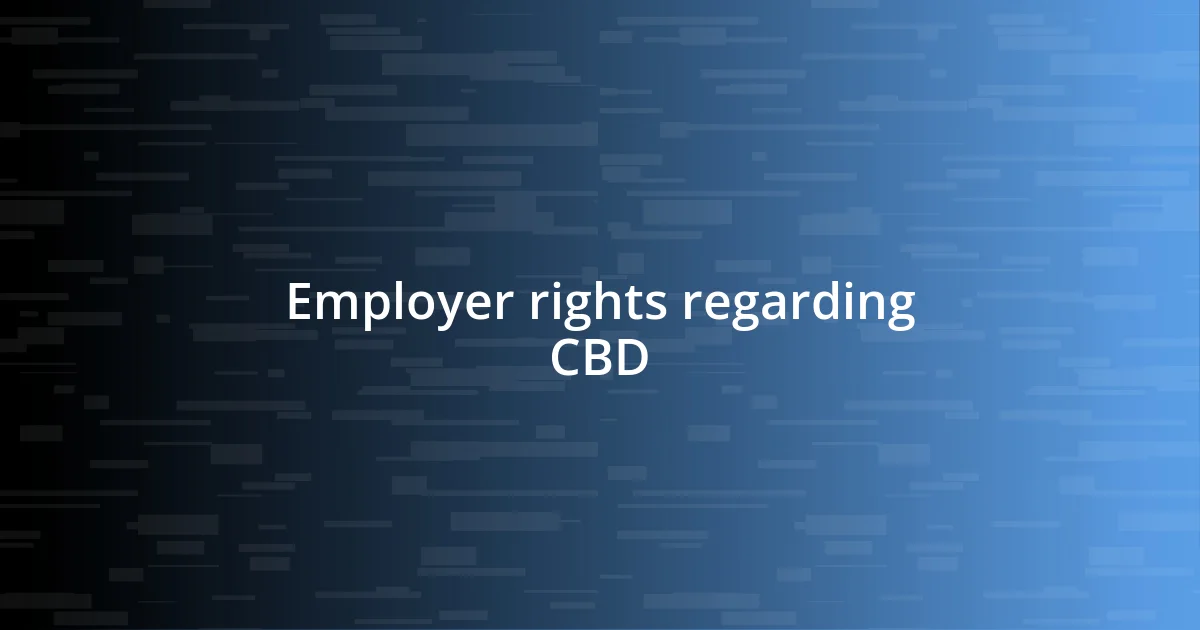
Employer rights regarding CBD
Employer rights regarding CBD encompass several critical considerations. From my experience, employers have the authority to enforce drug policies linking CBD use to workplace safety and productivity. This means they can regulate or even prohibit CBD use during work hours, especially in safety-sensitive positions. I recall a time when I was part of a team that had to navigate a tense situation regarding an employee who used CBD for anxiety but struggled with attendance. The mixed signals surrounding CBD left management feeling uncertain about how to proceed.
Here are some key aspects of employer rights regarding CBD:
- Policy Development: Employers can create and implement drug-free workplace policies that address CBD use explicitly.
- Disciplinary Action: Employers retain the right to take disciplinary action against employees who violate these policies.
- Testing Regulations: Employers may require drug testing that can potentially detect CBD or its metabolites.
- Safety Concerns: Employers can prioritize safety in occupations involving machinery or hazardous materials, limiting CBD use to protect all employees.
Navigating these dynamics is crucial, as I’ve witnessed firsthand how clear communication about policies can transform the workplace atmosphere. When management sets expectations, it not only safeguards the company but also fosters trust among employees. I remember an instance where a straightforward policy discussion eased anxieties among employees, encouraging them to engage openly without fear of repercussions. It’s through this clarity that workplaces can thrive rather than be held back by misunderstandings.
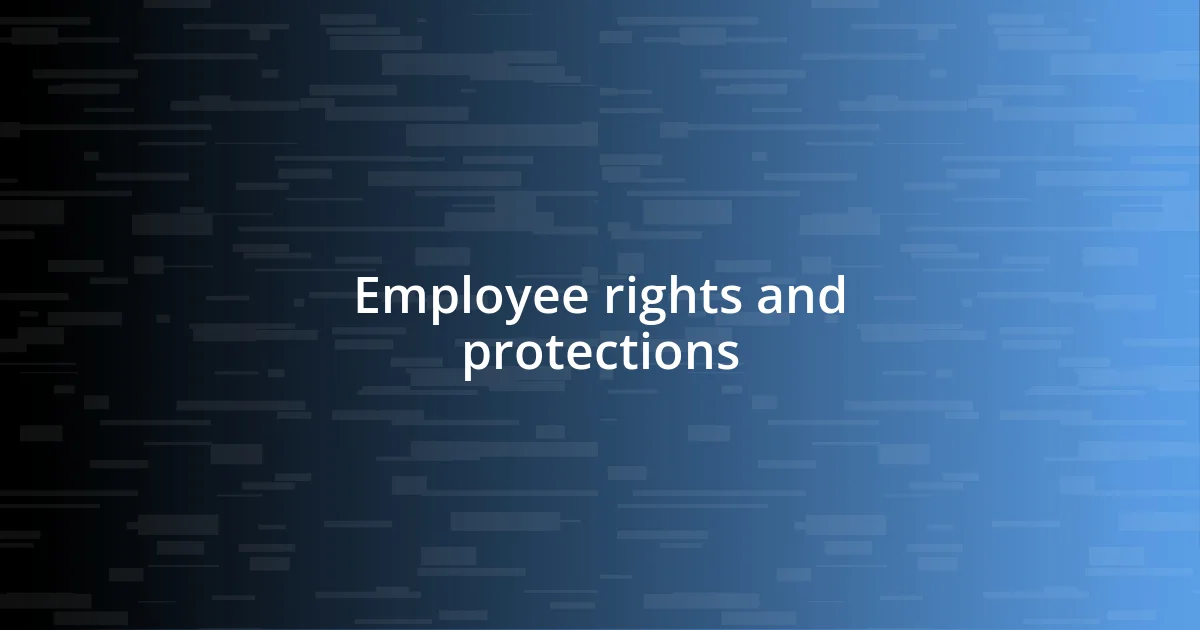
Employee rights and protections
Employee rights regarding CBD use are becoming an increasingly crucial topic, especially in light of the varied legal landscape. I recall discussing this matter with a friend who works in the tech industry, and he shared his concern about a colleague who faced termination after a positive drug test for CBD. It struck me that many employees aren’t fully aware of their rights when it comes to using CBD, reflective of broader confusion around cannabis laws. Simply put, employees deserve clarity about their protections to feel secure in their choices.
As I’ve engaged with employees across different sectors, it’s become clear that many aren’t aware of how state laws impact their rights. For instance, in one conversation with a barista who used CBD for anxiety, she told me about her fear of being written up due to a random drug test, even though she was compliant with her state’s laws. The tension between personal well-being and workplace policy poses a significant dilemma for many. Shouldn’t employees be able to use products that help them without fear of losing their jobs?
It’s important to emphasize that employees have legal protections, especially in states with laws permitting CBD use. My own experience as a volunteer in a local legal aid clinic opened my eyes to how unaware many workers are of their protections. Several individuals expressed relief at learning they could discuss their CBD use without immediate repercussions. This hints at the importance of employers fostering an environment where employees feel safe to communicate about their health practices without the shadows of stigma or misunderstanding hanging over them.
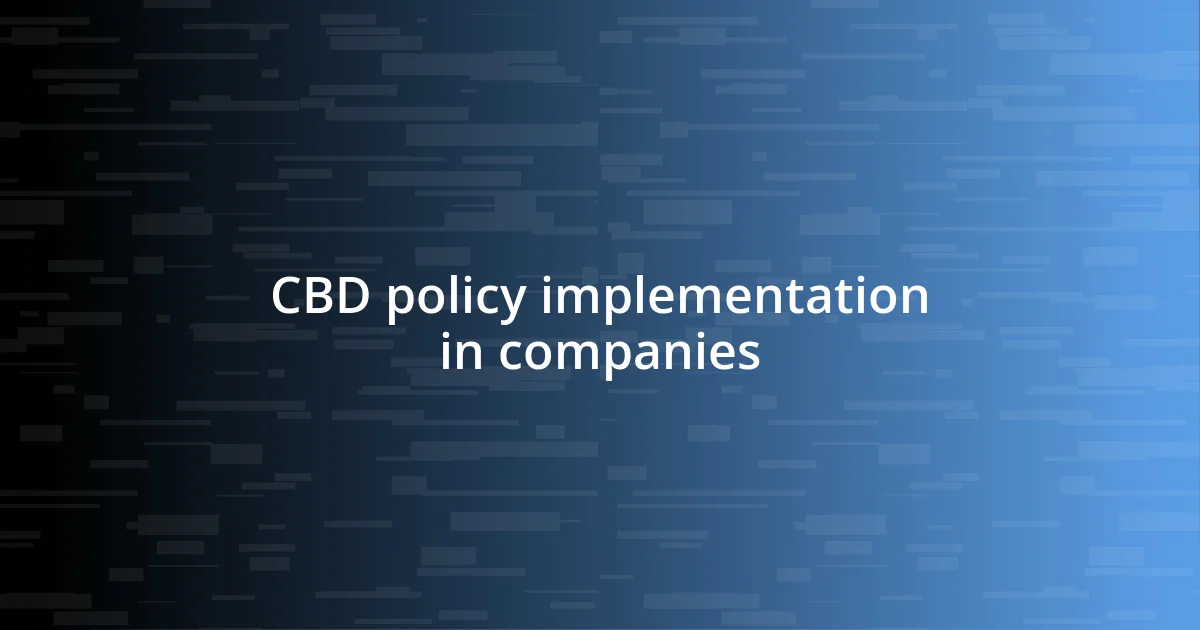
CBD policy implementation in companies
Implementing a CBD policy within a company requires a thoughtful approach, especially given the evolving legal landscape. In my experience, clear guidelines from the start can make a significant difference. I remember working with a startup that took proactive steps to draft a policy. They consulted legal experts and formed a committee that included employee representatives. This not only ensured compliance but also fostered a sense of ownership among staff. Isn’t it fascinating how inclusivity can lead to better acceptance and understanding?
Another crucial aspect of CBD policy implementation is regular training for management and employees alike. I’ve seen firsthand how a well-informed workforce can alleviate fears surrounding CBD use. In one instance, during a company-wide meeting, our HR manager dedicated a segment to address CBD. The questions that came up were a mix of curiosity and concern, but by the end, employees felt more at ease knowing they could engage with the topic openly. Can you imagine how empowering that must have felt for those who were previously in the dark?
Lastly, ongoing assessment of the policy’s impact is essential. I recall when a company I consulted for decided to gather anonymous feedback after six months of their newly implemented policy. The results were eye-opening! Many employees appreciated the flexibility, while a few expressed lingering fears about being tested. By being responsive to these concerns, the company refined its approach and ultimately created an environment that prioritized both safety and well-being. Isn’t it vital for companies to adapt and continuously improve their policies based on employee feedback?
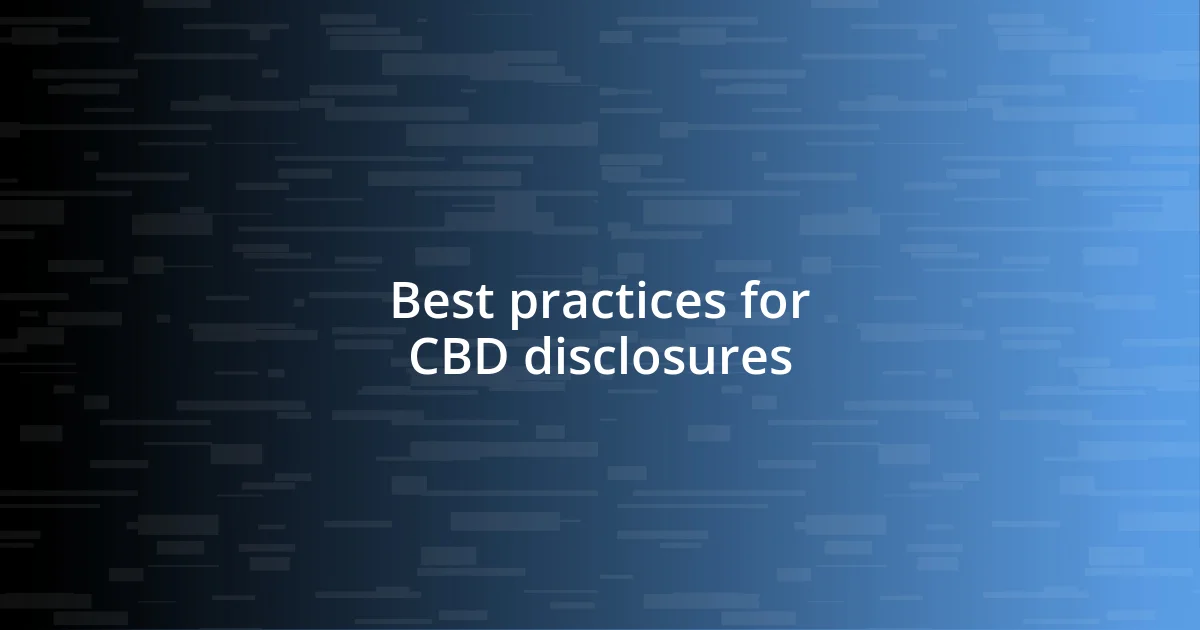
Best practices for CBD disclosures
Keeping disclosures about CBD use clear and concise is essential for maintaining transparency in the workplace. I remember having a conversation with a colleague who felt anxious about whether to disclose her CBD use during recruitment. She questioned whether it would create immediate bias against her, despite her need for it. This situation highlights that employers should encourage an open-door policy for discussions about CBD, relieving employee stress while promoting a culture of trust.
When advising companies on CBD disclosures, I’ve found that clarity in policy language is crucial. For example, a local café I consulted for drafted a simple one-pager outlining CBD use expectations. Employees appreciated this straightforward documentation, as it removed ambiguity and provided clear guidelines on reporting usage. Doesn’t it make you think about how much easier life could be if businesses embraced simple, open communication rather than leaving employees guessing?
It’s also beneficial to have regular disclaimer sessions where employees can question and discuss CBD-related topics. During one of our quarterly meetings at a nonprofit organization, I was struck by how the topic of CBD sparked lively discussions among team members. Some shared their experiences and concerns, while others sought advice on navigating their personal and professional lives. The camaraderie built during these conversations was palpable. Afterward, I wondered: wouldn’t more workplaces thrive if they embraced such discussions instead of avoiding them?
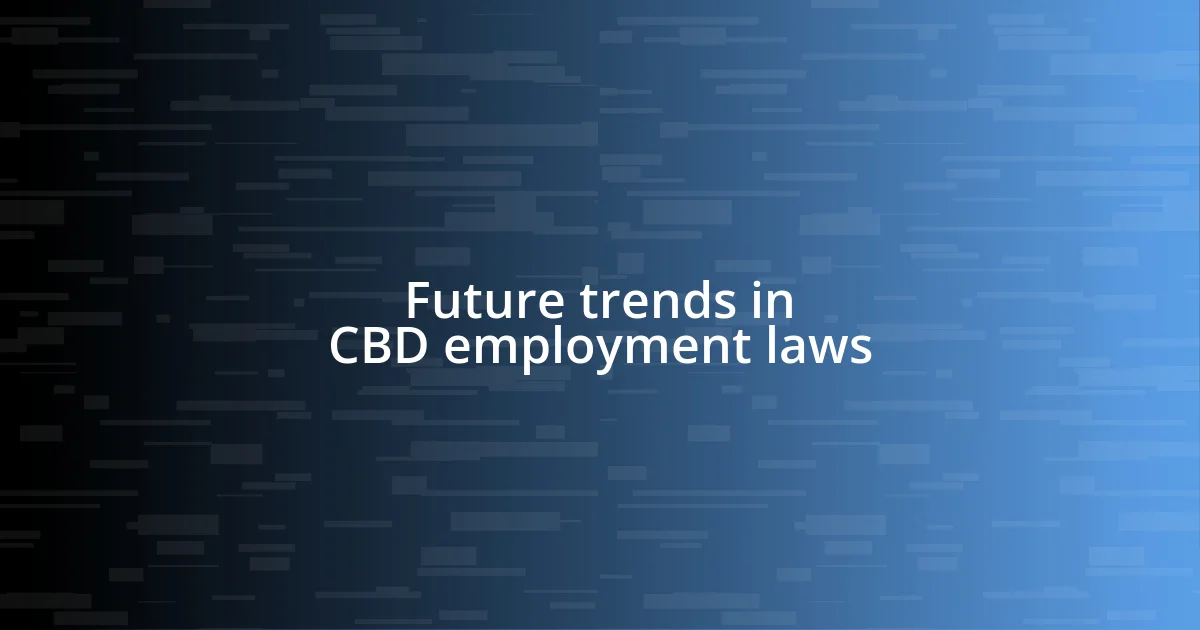
Future trends in CBD employment laws
As I envision the future of CBD employment laws, I can’t help but think about the increasing push for standardization across states. I recall a meeting with a legal expert who emphasized how a consistent framework could simplify compliance for multi-state employers. Imagine the relief they would feel if they didn’t have to navigate a maze of differing regulations!
Another trend that strikes me is the rising importance of employee wellness programs. I once worked with an organization that decided to include CBD education in their health seminars. This proactive step not only informed staff but also validated their choices regarding wellness. How powerful would it be if more companies recognized CBD as part of the broader wellness conversation, thus integrating it into their policies?
Lastly, I anticipate a shift toward more nuanced drug testing protocols. During a workshop, one HR director shared her frustration with current testing methods that don’t distinguish between hemp-derived CBD and other substances. It sparked a lively debate about fairness and workplace safety. Could the future hold a more empathetic approach to drug testing that considers the context of CBD use? I certainly hope so, as it would represent a significant evolution in supporting employee rights and wellbeing.














